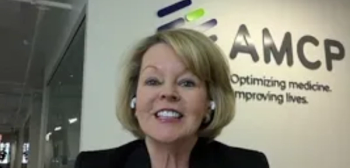
For patients with interstitial lung disease (ILD), a subsequent diagnosis of pulmonary hypertension substantially increases utilization of healthcare resources as well as costs.

For patients with interstitial lung disease (ILD), a subsequent diagnosis of pulmonary hypertension substantially increases utilization of healthcare resources as well as costs.

Biosimilars generally enter the market priced at roughly 50% of the amount of their reference drugs.

One theme of the Federal Trade Commission’s interim take on pharmacy benefit managers is vertical integration and how that affects competition in the industry.

Merith Basey, executive director of Patients for Affordable Drug, talks about strategies for lowering the cost of new drugs, especially cell and gene therapy, in a second part of a video interview conducted prior to the June 11-13 AHIP 2024 meeting in Las Vegas.

Merith Basey, M.Sc., executive director of Patients for Affordable Drugs, discusses her group's focus on the monopoly pricing of pharmaceutical companies and bills in Congress addressing patent reform and "pay for delay" strategies, in an interview with MHE previewing the presentation she's co-presenting on June 11 at the AHIP 2024 meeting in Las Vegas.

In the third part of this video series, Susan Cantrell, CEO of AMCP, discusses the impact of drug prices on patient adherence with Managed Healthcare Executive.

Simmering tensions in the pharmacy benefit management (PBM) industry have turned into fault lines. The PBMs challenging the "big three" have formed a trade association. Purchaser coalitions want change. The head of the industry's trade group says inherent marketplace friction has spilled over into political friction.

In this second part of a video series, AMCP CEO Susan Cantrell addressed the impact of high prescription drug prices on underserved communities, highlighting disparities in access caused by the pandemic's effects on minority populations. On the industry blame debate, she urged collaborative solutions, mentioning AMCP's engagement with diverse stakeholders to find comprehensive, patient-centric solutions and advocate for policy changes like the MVP Act to address rising costs and access challenges.

In this first part of a video series, Susan Cantrell, CEO of AMCP, discussed root causes of high drug prices, its impact on underserved communities and Medicare price negotiation, emphasizing AMCP's actions and the role of decreasing drug prices for equity.

The Health and Human Services department could wind up overpaying (or possibly underpaying) for the drugs for which it is negotiating a “maximum fair price” for Medicare under the Inflation Reduction Act, argue experts at the USC Schaeffer Center for Health Policy and Economics. A fuller picture of rebates and net prices could help that from happening, they say.

The report on drug spending touches on the rise of the GLP-1s. hows that As of January, semaglutide was the 5th ranked drug when it came to drug expenditures among Vizient pharmacy partners.

ICER adds a more formal process to evaluate the diversity of clinical trials and an assessment of a product’s impact on patient and caregiver productivity. ICER also plans to evaluate how newer methods — which would consider the change of a drug’s price over time and disease severity — can be applied to its value assessment.

An analysis by 3 Axis Advisors has found that there is a large variability in pharmacy reimbursement of prescription drugs depending on PBM contracts with insurers. This creates a system with huge inconsistences on the prices of both generics and branded products.

Charging more than $2 million for a single treatment was once unthinkable, but no more.

Recent years have brought a host of new orphan medications for rare disorders, and more are coming. But the U.S. hasn’t yet settled on a way to handle their often astronomical prices — and neither has any other country.

ICER analysts remain uncertain about using amyloid removal as a surrogate marker for clinical benefit in Alzheimer’s disease.

The majority of guidelines and recommendations available limit biologics to cases of severe and uncontrolled chronic rhinosinusitis with nasal polyps (CRSwNP) and require prior surgery.

An OptumRx drug pipeline report highlights Zynteglo, a curative gene therapy treatment for beta-thalassemia, and Skysona, a gene therapy for a cerebral adrenoleukodystrophy. FDA approval decision are imminent for both. Price tags of $2 million are expected.

Those living with diabetes who don't have insurance will pay $35 for a 30-day supply of Sanofi U.S. insulins.


A review of multiple studies found the COVID-19 exacerbated the economic, social and psychological difficulties that patients with cancer were already facing because of their cancer.

The review, partly funded by Amgen, the maker of Riabni, makes the case for using the biosimilar to Rituxan for all indications of the originator.

Two studies published this week documented the billions that Medicare and Medicaid spend on drugs that have been granted accelerated approval by the FDA based on surrogate end points. A study reported today in JAMA Health Forum found that only 6 of the 22 confirmatory trials used clinical outcomes.

Kirsten Axelsen, Richard Frank and Rachel Sachs agreed that the rapid development of the COVID-19 vaccines was a government-business success story. There was less to celebrate as the Kaiser Family Foundation panelists also unpacked the legal issues and economic consequences of drug rebates, international reference pricing, high deductible health coverage and compulsory licensing.

Findings in JAMA Health Forum show that new formulations were more likely for blockbuster drugs and drugs that received accelerated approval. Proxy measures of clinical usefulness and other elements of therapeutic value were not associated with new formulations.